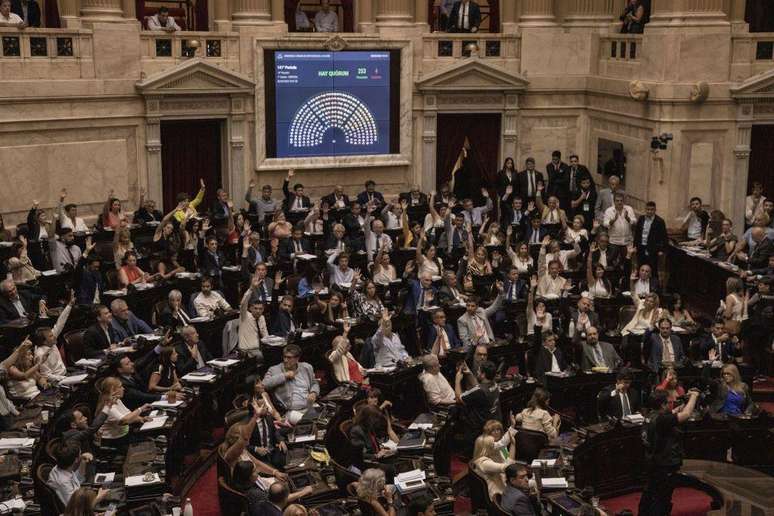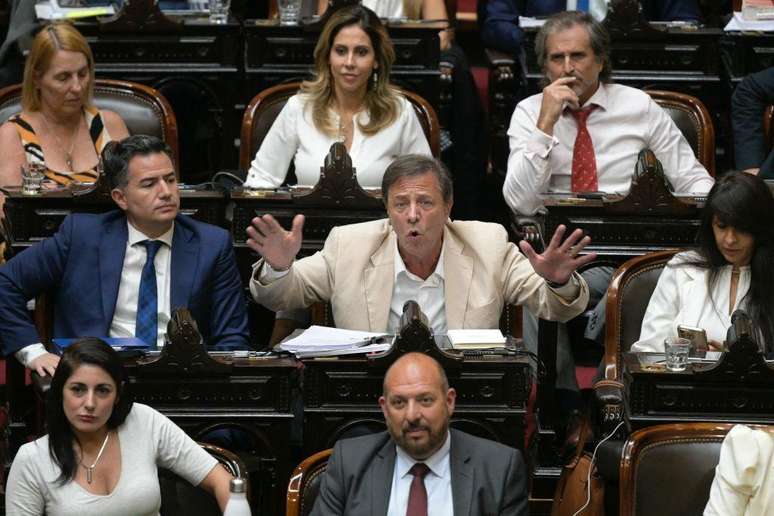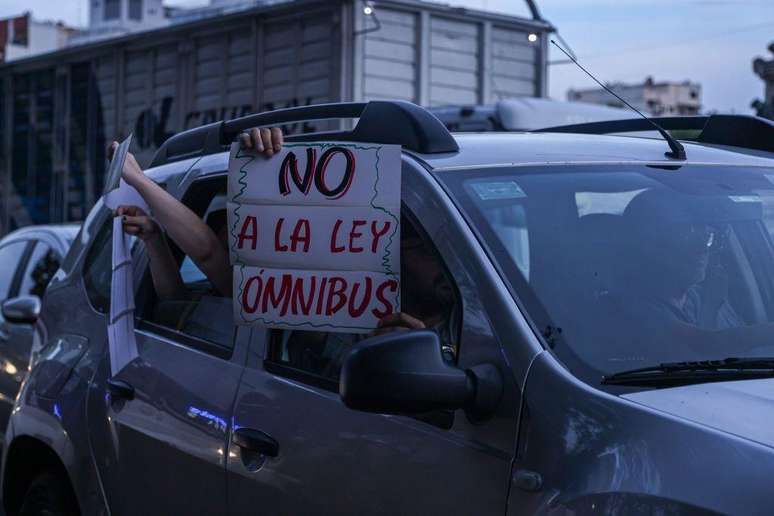The parliamentary rejection of the ambitious reform package has put the Argentine president in a complicated situation, who now has to decide on his new strategy.
The president of Argentina, Javier Milei, had defined the initiative as “a bill that could very well determine the fate of our country”.
But on Tuesday (6/2) he decided to withdraw his emblematic Law of the Bases and Starting Points for the Freedom of Argentines – better known as the “omnibus law” -, the package with which he planned to carry out a liberal reform in the country .
This occurred after the main articles of the law were rejected by the majority of deputies in the Chamber of Deputies, where the package was being voted on article by article, after having been approved in its general lines last week, after three days of heated debates (which gave rise to violent demonstrations in front of Parliament).

The president’s decision, who ordered from Israel – where he is on his first international trip after taking office – that the package of laws be returned to the commissions, was surprising, because it means that everything is back to square one. In other words, the general approval is no longer valid.
If the government wants to re-present the Basic Law, which it has so far considered the cornerstone of its reform plan, it will have to repeat the entire parliamentary process from the beginning.
However, the Minister of the Interior, Guillermo Francos, underlined on Wednesday (7/2) that the government has not decided whether to resubmit the project, which provides for the granting of extraordinary powers to the president to legislate without going through Congress, the opening of the possibility of privatizing several state companies, limiting the right to protest and giving greater powers to the security forces, among the points that have aroused the greatest resistance.
The government had already significantly reduced the original proposal – it went from around 660 articles to around 380 and tax issues were excluded – with the aim of obtaining its approval.
After the decision to return the project to the committees, the government issued a statement in which it addressed its attacks on the governors, with whom it is in conflict over the distribution of federal revenues, stating that “they have decided to destroy the law”, despite having previously agreed to commit to supporting it.
Milei, an Israeli, accused parliamentarians who rejected the package of going against the popular mandate.
“The caste has taken a stand against the change that we Argentines have voted for at the polls. We know that it will not be easy to change a system in which politicians have enriched themselves at the expense of Argentines who get up every day to work”, he published on his account on X (formerly Twitter).
“Our government program was voted by 56% of Argentines and we are not willing to negotiate it with those who destroyed the country. There are sectors of politics that oppose the changes that the country needs. They will have to explain to society the because,” he continued.
And now?
The rejection of the landmark Milei bill highlighted a reality that will complicate any government plan to return to office in Congress.
And, although the Libertarian won the election comfortably, his victory came in the second round.
In the first round – the one valid for obtaining seats in Congress – it obtained only 30% and ranked in second place, 7 points behind Kirchnerism-Peronism, which obtained a majority in both houses of the Legislature.

With these electoral results, Milei’s La Libertad Avanza group currently has around 40 seats in the Chamber and just 7 in the Senate. This represents about 15% of the entire Congress.
Even with the votes of allies, such as PRO legislators (former president Mauricio Macri’s force), the vote on the “omnibus law” demonstrated that the government does not have enough parliamentary strength.
That’s why some believe he won’t try to push his reform package through Congress again.
An alternative could be that, instead of another “omnibus bill”, the government tries to reach consensus with the opposition point by point and sends out separate bills with the main reforms for which it can gain support.
However, the failure of negotiations with the governors for the approval of the Basic Law showed another apparent weakness of this government: its lack of experience and political maneuverability.
“There was a lot of negligence,” said political scientist Ignacio Ortelli of Radio Rivadavia.
“The government said the law has been approved,” he said, referring to the confidence Milei seemed to have before starting the trip, which will also take him to Italy and the Vatican.
The truth is that La Libertad Avanza only arrived on the political scene with the 2021 legislative elections, and Milei himself is an outsider, who dedicated himself to the work of an economist in the private sector and began to make himself known as an eccentric program commentator of opinion, before entering politics just three years ago.
Plebiscite?

Given that Milei’s main political capital is his victory last November, with nearly 56% of the vote, many in Argentina speculate that the president could try to govern through popular consultations.
He has said in the past that if he did not gain political consensus for any of his initiatives he would “call a plebiscite”.
After the failure of the “omnibus law” in Congress, presidential spokesman Manuel Adorni assured that Milei “has made the decision” to carry forward the measures envisaged by the overturned project, and that “he will do so with the tools that the Constitution allows”.
Argentina’s Magna Carta allows the Executive Power to carry out popular consultations on bills.
One of the most remembered plebiscites in Argentine history was the one held by then president Raúl Alfonsín in 1984, fundamental for the approval of the Peace Treaty with Chile, which put an end to the Beagle Conflict.
But this tool has its limitations. The main one is that it is not binding. In other words: it listens to the opinion of the population, but cannot replace Congress and serve to pass a law.
However, the idea of libertarians who support this option is that it serves to put pressure on the Legislature, with the idea that if they rejected a law approved by a plebiscite they would vote “against the people”.
However, both the government’s detractors and supporters warn that this is a double-edged sword: if the government loses a plebiscite, it could also lose legitimacy (and, therefore, governability).
The most dramatic case occurred a few years ago in the United Kingdom, when David Cameron called a plebiscite on the country’s exit from the European Union, thinking it would be rejected, and had to resign after surprising support for Brexit.
In this sense, some in Argentina point out that several opinion polls show a decline in the president’s image in his first two months in power.

While his approval rating generally remains above 50%, some polls have seen drops of up to 10 points.
One of the most recent, from CB Consultora Opinión Pública, underlines that Milei’s image has collapsed in all Argentine provinces, even if only in three of the 24 districts has he received more rejections than approval.
Most experts attribute this to the sharp economic adjustment imposed by the president as soon as he took office, which included a devaluation of the peso, which lost half its value against the dollar, and which caused enormous consternation in an already hit by the economic crisis. highest inflation in the world.
Source: Terra
Rose James is a Gossipify movie and series reviewer known for her in-depth analysis and unique perspective on the latest releases. With a background in film studies, she provides engaging and informative reviews, and keeps readers up to date with industry trends and emerging talents.






